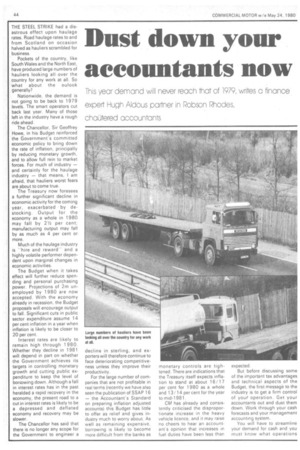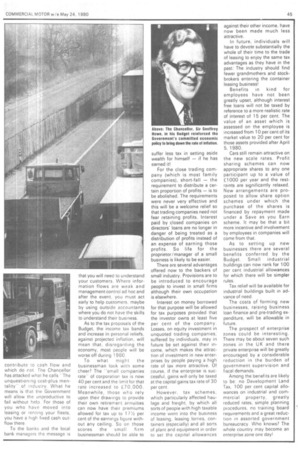Dust down your accountants now
Page 46

Page 47

If you've noticed an error in this article please click here to report it so we can fix it.
This year demand will never reach that of 1979, writes a finance expert Hugh Alclous partner in Robson Rhodes, chautered accountants
THE STEEL STRIKE had a disastrous effect upon haulage rates. Road haulage rates to and from Scotland on occasion halved as hauliers scrambled for business.
Pockets of the country, like South Wales and the North East, have produced large numbers of hauliers looking all over the country for any work at all. So what about the oulook generally?
Nationwide, the demand is not going to be back to 1979 levels. The smart operators cut back last year. Many of those left in the industry have a rough ride ahead.
The Chancellor, Sir Geoffrey .Howe, in his Budget reinforced
the Government's committed economic policy to bring down the rate of inflation, principally by reducing monetary growth, and to allow full rein to market forces. For much of industry — and certainly for the haulage industry — that means, I am afraid, that hauliers worst fears are about to come true.
The Treasury now foresees a further significant decline in economic activity for the coming year, exacerbated by destocking. Output for the
economy as a whole in 1980 may fall by 21/2 per cent; manufacturing output may fall by as much as 4 per cent or more.
Much of the haulage industry is "hire and reward" and a highly volatile performer dependent upon marginal changes in economic activities.
The Budget when it takes effect will further reduce spen ding and personal purchasing power. Projections of 2m unemployed by 1980 are now accepted. With the economy already in recession, the Budget proposals will encourage output to fall. Significant cuts in public sector expenditure assume 14 per cent inflation in a year when inflation is likely to be closer to 20 per cent.
Interest rates are likely to remain high through 1980. Whether they decline in 1 981 will depend in part on whether the Government achieves its targets in controlling monetary growth and cutting public expenditure to keep the level of borr.owing down. Although a fall in interest rates has in the past heralded a rapid recovery in the economy, the present road to a cut in interest rates is likely to be a depressed and deflated economy and recovery may be slower.
The Chancellor has said that there is no longer any scope for the Government to engineer a decline in sterling, and exporters will therefore continue to face deteriorating competitiveness unless they improve their productivity.
For the large number of companies that are not profitable in real terms (recently we have also seen the publication of SSAP 16 — the Accountant's Standard on preparing inflation adjusted accounts) this Budget has little to offer as relief and gives industry much to worry about. As well as remaining expensive, borrowing is likely to become more difficult from the banks as monetary controls are tightened. There are indications that the Treasury itself expects inflation to stand at about 1 6/1 7 per cent for 1980 as a whole and 13/14 per cent for the year to mid-1981.
CM has already and consistently criticised the disproportionate increase in the heavy vehicle licence, and it may raise no cheers to hear an accountant's opinion that increases in fuel duties have been less than
expected.
But before discussing some of the important tax advantages and technical aspects, of the Budget, the first message to the industry is to get a firm control of you operation. Get your accountants out and dust them down. Work through your cash forecasts and your management accounting system.
You will have to streamline your demand for cash and you must know what operations contribute to cash flow and which do not_ The Chancenor has attacked what he calls The unquestioning cost-plus mentality"' of Industry. What he means is that the Government will allow the unproductive to fail without help. For those of you who have moved into leasing or renting your fleets, you have a hLgh fixed cash outflow there.
To the banks and the local bank managers the message is
that you will need to understand your customers. Where information flows are weak and management control ad hoc and after the event, you must act early to help customers, maybe by using outside accountants where you do not have the skills to understand their business.
As to the tax proposals of the Budget, the income tax bands and increase in personal reliefs, against projected inflation, will mean that, disregarding the economy, most people will be worse off during 1980.
To what might the businessman look with some cheer? The "small companies rate" of corporation tax is now 40 per cent and the limit for that rate increased to £70,000. Meanwhile, those who rely upon their drawings to provide their own retirement annuities can now have their premiums allowed for tax up to 171/2 per cent of the earnings figure without any ceiling. So on those scores the small -firm businessman should he able to suffer less tax in setting aside wealth for himself — if he has earned it!
For the close trading company (which is most family companies), short-fall — the requirement to distribute a certain proportion of profits — is to be abolished. The requirements were never very effective and this will be a welcome relief so that trading companies need not fear retaining profits. Interest paid by closed companies on directors' loans are no longer in danger of being treated as a distribution of profits instead of an expense of earning those profits. So life for the proprietor/manager of a small business is likely to be easier.
There are several advantages offered now to the backers of small industry. Provisions are to be introduced to encourage people to invest in small firms although their own occupation is elsewhere.
Interest on money borrowed for that purpose will be allowed for tax purposes provided that the investor owns at least five per cent of the company.
Losses, on equity investment in unquoted trading companies, suffered by individuals, may in
future be set against their in
come, which makes the attraction of investment in new enter prises by people paying a high rate of tax more attractive. Of course, if the enterprise is suc cessful, gains will only be taxed at the capital gains tax rate of 30 per cent.
However, tax schemes, which particularly affected haulage and freight, by which all sorts of people with high taxable income went into the business of leasing, leasing lorries, con tainers (especially) and all sorts of plant and equipment in order to set the capital allowances against their other income, have now been made much less attractive.
In future, individuals will have to devote substantially the whole of their time to the trade of leasing to enjoy the same tax advantages as they have in the past: The industry should find fewer grandmothers and stockbrokers entering the container leasing business!
Benefits in kind for employees have not been greatly upset, although interest free loans will not be taxed by reference to a more realistic rate of interest of 15 per cent. The value of an asset which is assessed on the employee is increased from 10 per cent of its market value to 20 per cent for those assets provided after April 5, 1980.
Cars still remain attractive on the new scale rates. Profit sharing schemes can now appropriate shares to any one participant up to a value of £1000 per year and the restraints are significantly relaxed. New arrangements are proposed to allow share option schemes under which the purchase of the shares is financed by repayment made under a Save as you Earn scheme. It may be that a bit more incentive and involvement by employees in companies will come from that.
As to setting up new businesses there are several benefits conferred by the Budget. Small industrial buildings can now rank for 100 per cent industrial allowances for which there will be simpler rules.
Tax relief will be available for industrial buildings built in advance of need.
The costs of forming new businesses, raising business loan finance and pre-trading expenditure, will be allowable in future.
. The prospect of enterprise zones could be interesting. There may be about seven such zones in the UK and there private enterprise will be greatly encouraged by a considerable reduction in the burden of government supervision and fiscal demands.
Among the benefits are likely to be: no Development Land Tax, 100 per cent capital allowances on industrial and commercial property, greatly reduced rates, simple planning procedures, no training board requirements and a great reduction in assorted government bureaucracy. Who knows? The whole country may become an enterprise zone one day!
































































































































